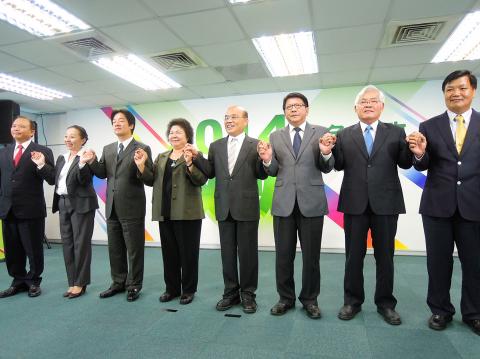Democratic Progressive Party (DPP) Chairman Su Tseng-chang (蘇貞昌) yesterday set an ambitious goal for the mayoral and commissioner elections next year — to win at least half of the 22 administrative zones across the country — as the party announced its first batch of candidates for the elections.
“The DPP hopes that it can win in at least three of the six special municipalities and eight of the 16 cities and counties,” Su told a press conference after he introduced the DPP’s first group of seven candidates for the mayoral and commissioner elections.
Three of the seven nominees, officially approved at a Central Executive Committee (CEC) meeting yesterday, were candidates who won party primaries in the past month, including Nantou County’s Lee Wen-chung (李文忠), Pan Men-an (潘孟安) of Pingtung County and Lee Chin-yung (李進勇) of Yunlin County.

Photo: CNA
The other four are all incumbent mayors and commissioners, including Greater Kaohsiung Mayor Chen Chu (陳菊), Greater Tainan Mayor William Lai (賴清德), Chiayi County Commissioner Helen Chang (張花冠) and Yilan County Commissioner Lin Tsung-hsien (林聰賢).
While the mayoral and commissioner elections will only be part of the seven-in-one elections, which will also elect special municipality councilors, county and city councilors, township mayors, township councilors and borough and village wardens, Su said the DPP hoped to gain ground in the other elections as well.
The DPP has only won more than half of the mayoral and commissioner elections once in its 27-year history, securing 12 of the 23 administrative zones nationwide in 1997, when special municipality mayoral elections had yet to be introduced.
With regards to special municipality elections, if the DPP secures the two seats it currently holds, Greater Kaohsiung and Greater Tainan, it would have to win either in Taipei, New Taipei City (新北市), Greater Taichung or Taoyuan to reach the 50 percent mark.
Party primaries will be held in the coming months to determine the DPP candidates in the other constituencies.
In related news, DPP New Taipei City Chapter director Lo Chih-cheng’s (羅致政) withdrawal from the New Taipei City primary and his complaints about the primary process dominated the CEC meeting.
With two weeks left before a public opinion poll on Dec. 2 to determine the primary winner, Lo abruptly pulled out of the race and said that the party headquarters’ “strategic considerations and scheduling decisions” had left him with not enough time to prepare for his campaign.
There have been reports that Su favored former premier Yu Shyi-kun (游錫堃), Lo’s main rival in the primary, so a task force, designated by the DPP headquarters, pushed the date of the poll ahead because Yu was leading.
Lai, the convener of the task force, which is in charge of conducting negotiations between three aspirant candidates in New Taipei City, told reporters that all of them had agreed on the date and signed the agreement statement.
DPP Legislator Gao Jyh-peng (高志鵬), who was on the task force, lambasted Lo for retracting his agreement, saying that Lo would have been unable to cut Yu’s lead — 45 percent against Lo’s 9 percent — even if he had been given more time.

A preclearance service to facilitate entry for people traveling to select airports in Japan would be available from Thursday next week to Feb. 25 at Taiwan Taoyuan International Airport, Taoyuan International Airport Corp (TIAC) said on Tuesday. The service was first made available to Taiwanese travelers throughout the winter vacation of 2024 and during the Lunar New Year holiday. In addition to flights to the Japanese cities of Hakodate, Asahikawa, Akita, Sendai, Niigata, Okayama, Takamatsu, Kumamoto and Kagoshima, the service would be available to travelers to Kobe and Oita. The service can be accessed by passengers of 15 flight routes operated by

Chinese spouse and influencer Guan Guan’s (關關) residency permit has been revoked for repeatedly posting pro-China videos that threaten national security, the National Immigration Agency confirmed today. Guan Guan has said many controversial statements in her videos posted to Douyin (抖音), including “the red flag will soon be painted all over Taiwan” and “Taiwan is an inseparable part of China,” and expressing hope for expedited reunification. The agency last year received multiple reports alleging that Guan Guan had advocated for armed reunification. After verifying the reports, the agency last month issued a notice requiring her to appear and explain her actions. Guan

GIVE AND TAKE: Blood demand continues to rise each year, while fewer young donors are available due to the nation’s falling birthrate, a doctor said Blood donors can redeem points earned from donations to obtain limited edition Formosan black bear travel mugs, the Kaohsiung Blood Center said yesterday, as it announced a goal of stocking 20,000 units of blood prior to the Lunar New Year. The last month of the lunar year is National Blood Donation Month, when local centers seek to stockpile blood for use during the Lunar New Year holiday. The blood demand in southern Taiwan — including Tainan and Kaohsiung, as well as Chiayi, Pingtung, Penghu and Taitung counties — is about 2,000 units per day, the center said. The donation campaign aims to boost

The Central Weather Administration (CWA) said a magnitude 4.9 earthquake that struck off the coast of eastern Taiwan yesterday was an independent event and part of a stress-adjustment process. The earthquake occurred at 4:47pm, with its epicenter at sea about 45.4km south of Yilan County Hall at a depth of 5.9km, the CWA said. The quake's intensity, which gauges the actual effects of a temblor, was highest in several townships in Yilan and neighboring Hualien County, where it measured 4 on Taiwan's seven-tier intensity scale, the CWA said. Lin Po-yu (林柏佑), a division chief at the CWA's Seismological Center, told a news conference